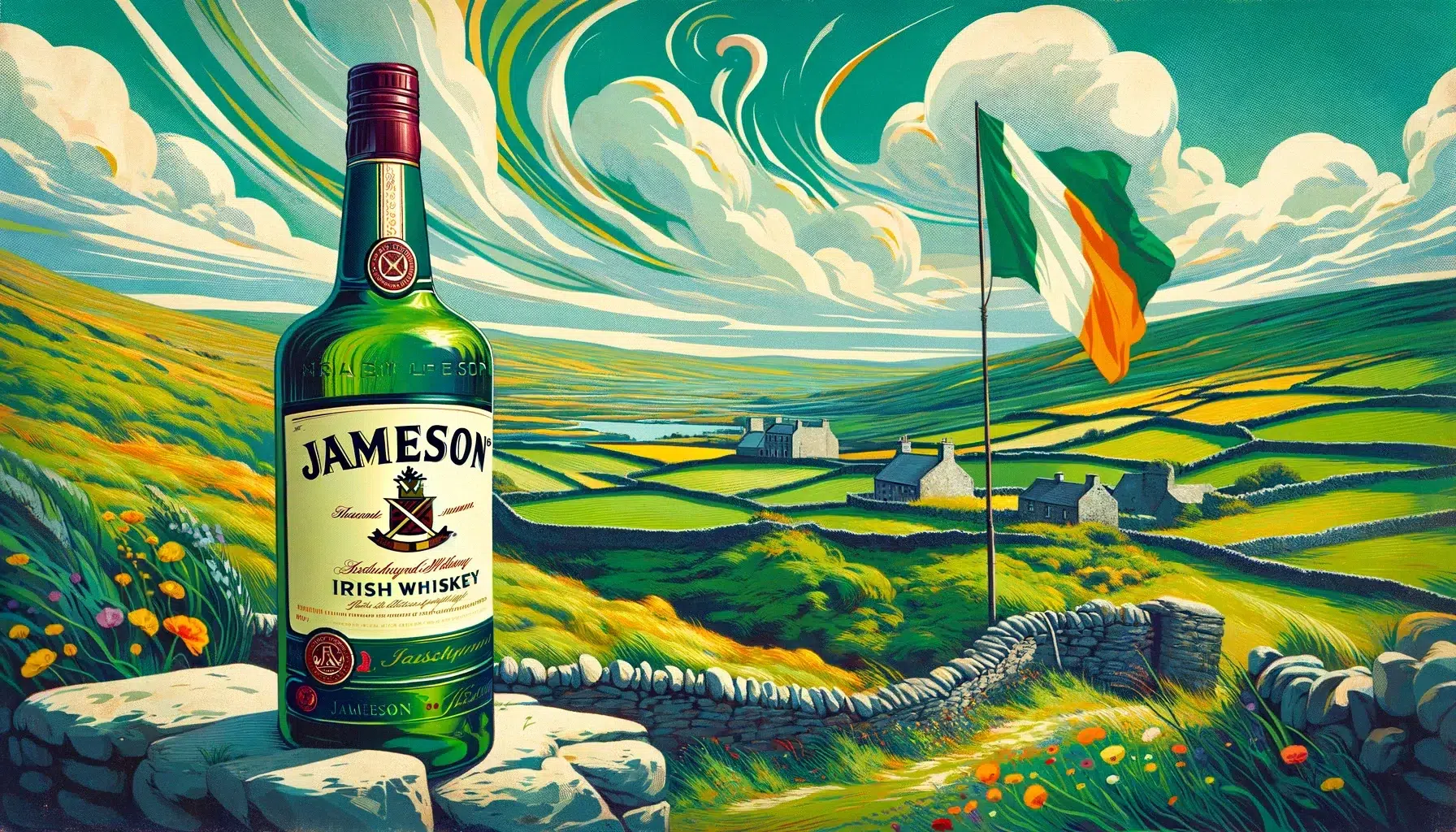Irish whiskey is often seen as the lesser-known little brother of its Scottish and American counterparts. However, it carves its niche with unparalleled smoothness and approachability.
This unique character sets it apart in the vast world of whiskies, offering a distinct experience that distinguishes Irish whiskey as a category in its own right. Key varieties of Irish whiskey include Single Malt, Single Pot Still, and Blended Whiskeys, each known for their distinct flavors. Single Grain Irish whiskey also stands out, offering a lighter but complex choice for whiskey lovers.
Diving deeper, each type of Irish whiskey presents its own set of flavors, production techniques, historical significance, and recommendations for food pairings. The following sections will explore these aspects in detail, providing a richer understanding of what makes Irish whiskey a cherished spirit worldwide.
A Beginners Introduction to Irish Whiskey
So, what do you need to know about Irish Whiskey as a complete newbie? Well, Irish whiskey is a fantastic choice if you’re just getting into whiskey. It’s known for being super smooth and easy to sip, which comes from a special triple distillation process. This process makes Irish whiskey lighter and smoother than other types like Scotch or Bourbon. Plus, to be real Irish whiskey, it has to spend at least three years aging in wooden barrels on the island of Ireland.
The way Irish whiskey is made is really interesting. It starts with malting some barley, which is then mashed and fermented. The liquid is distilled three times to get that signature smoothness. After that, it’s aged in oak barrels, where it takes on rich and complex flavors. This traditional process is what makes Irish whiskey stand out from it’s siblings.
Types of Irish Whiskey
Irish whiskey branches into four distinct types, each marked by its own flavor characteristics and production methods.
| Type of Irish Whiskey | Description | Example Brands/Expressions |
|---|---|---|
| Single Malt Irish Whiskey | Crafted solely from 100% malted barley and distilled in pot stills, known for its richness and complexity. | – Bushmills 10 Year Single Malt – Teeling Single Malt – Knappogue Castle 12 Year Single Malt |
| Single Pot Still Irish Whiskey | Made from a mix of malted and unmalted barley, distilled in a pot still, offering a creamy texture and spicy flavor. | – Redbreast 12 Year – Green Spot – Powers John’s Lane Release |
| Single Grain Irish Whiskey | Produced from grains other than barley, such as corn or wheat, resulting in a lighter and more delicate taste. | – Teeling Single Grain – Kilbeggan Single Grain – Glendalough Double Barrel Single Grain |
| Blended Irish Whiskey | Combines two or more whiskey types, balancing their characteristics to create a harmonious and versatile flavor. | – Jameson Irish Whiskey – Tullamore D.E.W. Original – Bushmills Black Bush |
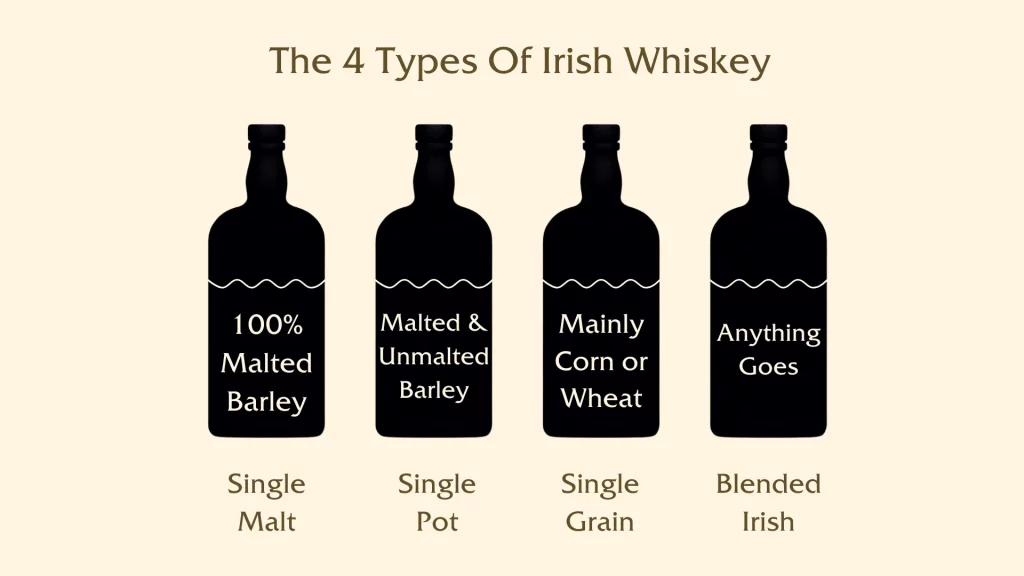
Distinct Characteristics of Irish Whiskey
Irish Whiskey stands out for its remarkable smoothness and distinctive taste, achieved through triple distillation and the use of unpeated malt. This results in a purer, smoother spirit that’s lighter and approachable for just about anyone.
Triple Distillation for Smoothness
Triple distillation is pivotal in crafting the smoothness synonymous with Irish whiskey. This method, involving three rounds of distillation, meticulously removes impurities, yielding a spirit that is exceptionally pure and velvety. This process is integral to providing a clean, refined taste that is both inviting and enjoyable, especially for those exploring whiskey for the first time.
Learn more about the distillation in our article on the whiskey distillation process.
Unpeated Malt for a Lighter Flavor
The choice of unpeated malt is crucial in defining the lighter flavor profile of Irish whiskey. Steering clear of the smoky characteristics imparted by peated malt, Irish whiskey opts for unpeated malt, ensuring a brighter, more accessible taste. This results in a whiskey that is refreshingly light, emphasizing the grain’s natural flavors and allowing the subtle nuances of the whiskey to emerge more prominently.
Learn more about the full process in our article on the whiskey production process.
The Rich Flavor Spectrum of Irish Whiskey
Irish Whiskey is one of the most versatile types of whiskey from any country. It offers a flavor range from light and floral to rich and robust, influenced by grain choice, distillation, and aging. Common notes include green apple, vanilla, and caramel.
Triple distillation ensures smoothness, while aging adds complexity with oak, spice, and fruit flavors. This diversity celebrates Ireland’s whiskey-making heritage, appealing to a wide array of tastes
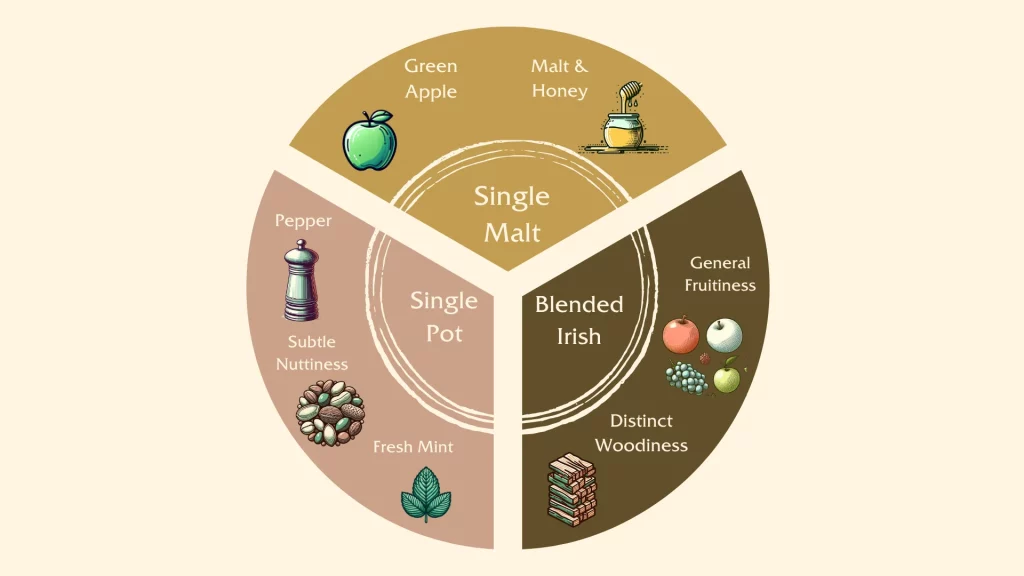
Signature Flavor Notes in Irish Whiskey
Irish Whiskey captivates with its signature flavor notes of green apple, vanilla, and caramel. These core flavors, resulting from meticulous ingredient selection and distillation, create a uniquely inviting taste profile. This distinctive combination renders Irish Whiskey a favored choice among both connoisseurs and casual enthusiasts.
Influence of Grain Bill on Flavor
The flavor of Irish Whiskey is deeply influenced by its grain bill, the blend of grains used in its production. Whether it’s barley, corn, or wheat, each grain contributes its own unique flavor characteristics, ranging from light and floral to rich and creamy. This variation underlines the wide-ranging taste experiences Irish Whiskey offers, highlighting its versatility.
The Role of Aging in Flavor Development
Aging plays a pivotal role in the flavor evolution of Irish Whiskey. As the whiskey matures in wooden casks, it absorbs and integrates complex notes of oak, spice, and fruitiness, enriching its flavor profile. The length of aging and the conditions under which it occurs further refine the whiskey, endowing it with a rich character and unparalleled depth.
Popular Brands of Irish Whiskey
As for brands, Jameson is the most recognized, known for its smoothness and accessibility. Bushmills and Tullamore D.E.W. are also popular, offering a range of approachable and flavorful options.
Jameson
Jameson is undoubtedly the most iconic Irish whiskey brand globally. Known for its smooth, approachable flavor, it’s a staple in bars and homes alike. Jameson’s triple distillation process ensures a light, clean taste, making it perfect for sipping neat or mixing in cocktails. It’s an excellent choice for those new to Irish whiskey.
Bushmills
Bushmills, the oldest licensed distillery in the world, offers a range of whiskies that are rich in tradition and flavor. Their whiskeys, particularly the Bushmills Original and Black Bush, are known for their smoothness, with hints of fruit and spice. Bushmills is ideal for those who appreciate a slightly richer, malt-forward profile.
Tullamore D.E.W.
Tullamore D.E.W. is another highly respected brand, celebrated for its smooth and versatile whiskies. Their signature blend, with its triple distillation and aging in a mix of barrels, provides a well-balanced, complex flavor. It’s a go-to choice for those looking for an accessible yet high-quality whiskey.
Which Irish Whiskey Should You Try First?
Selecting your initial foray into Irish Whiskey hinges on personal taste and the flavor profiles you find appealing. If you’re looking for some new items to add to your whiskey collection, here are specific recommendations to help guide your choice:
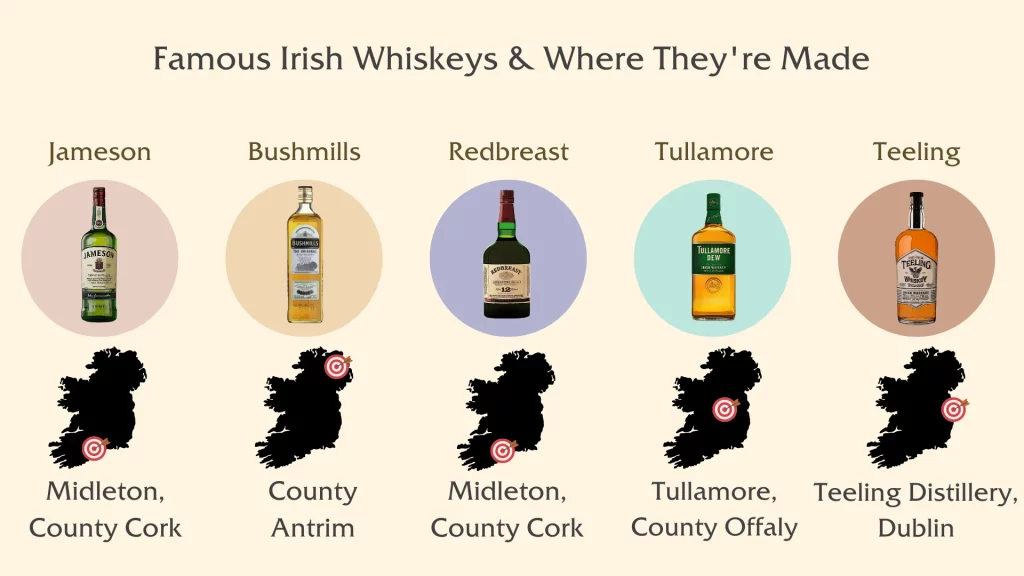
For Those Seeking Gentle, Smooth Flavors
If you’re drawn to gentle, smooth flavors, consider starting with a Single Grain or a light Blended Irish Whiskey. These whiskeys are known for their softness and approachability, providing a subtle complexity that’s accessible even to those new to the world of whiskey.
- Single Grain Irish Whiskey Recommendation: Teeling Single Grain. This whiskey is known for its smooth, sweet profile with hints of spice, making it an excellent introduction to the category.
- Light Blended Irish Whiskey Recommendation: Jameson Irish Whiskey. As a classic example of Irish Whiskey, Jameson offers a balanced flavor with notes of nuts, vanilla, and a touch of sweetness, ideal for newcomers.
For Enthusiasts of Bold, Spicy Notes
Those with a preference for bold and spicy flavors should explore Single Pot Still Irish Whiskey. This category is celebrated for its rich and full-bodied character, delivering a complex blend of spicy, woody, and occasionally fruity notes.
- Single Pot Still Irish Whiskey Recommendation: Redbreast 12 Year Old. Redbreast is a quintessential Single Pot Still Irish Whiskey, offering a rich, spicy, and fruity profile with a creamy mouthfeel.
For Lovers of Sweet, Rich Profiles
If you’re an aficionado of sweet, rich profiles, Single Malt Irish Whiskey might be the most enticing option. Known for its deep, flavor-packed character, Single Malt often features notes of caramel, vanilla, and fruit.
- Single Malt Irish Whiskey Recommendation: Bushmills 10 Year Old Single Malt. This whiskey showcases the depth and complexity of Single Malt Irish Whiskey, with a smooth finish and flavors of honey, fruit, and chocolate.
Irish Whiskey in Social Settings
Irish whiskey is a fantastic choice for social events, whether it’s a big celebration or a casual get-together.
Tips on Serving Irish Whiskey
Irish whiskey is a versatile choice for social events. When serving Irish whiskey, consider offering it in a variety of ways to cater to different tastes. Neat or on the rocks is perfect for those who enjoy the full flavor of the whiskey. For guests who prefer something lighter, you can offer popular whiskey cocktails like an Irish Coffee or a Whiskey Sour. Setting up a DIY whiskey bar is a fun idea, allowing guests to mix their drinks as they like, adding an interactive element to your event.
Best Irish Whiskey for Weddings
Weddings call for something special, and when it comes to Irish whiskey, you’ll want to choose something that’s both approachable and a little bit refined. Jameson is an excellent choice for toasts and cocktails, known for its smooth, easy-drinking profile that appeals to a wide range of guests. For a step up, Bushmills Black Bush offers a richer flavor that whiskey lovers will appreciate, while still being accessible enough for casual drinkers. It’s a great option for serving neat or with a splash of water to highlight its complexity.
Best Irish Whiskey for Holidays
Holidays are all about celebration, and the right Irish whiskey can make those moments even more special. For a premium option, Redbreast 12-Year-Old is a standout choice. Its deep, full-bodied flavor is perfect for toasting during festive gatherings, and it pairs beautifully with desserts or as a post-dinner treat. If you’re hosting a larger crowd, consider having a bottle of Jameson on hand—its versatility makes it ideal for mixing into holiday-themed cocktails or enjoying straight. With the right whiskey, your holiday celebration is sure to be a memorable one.
Popular Irish Whiskey Cocktails
Irish whiskey is incredibly versatile, lending itself beautifully to a range of classic and modern cocktails. Whether you prefer something warm and comforting or refreshing and citrusy, there’s an Irish whiskey cocktail for every occasion.
Classic Irish Coffee
The Irish Coffee is a timeless cocktail that’s perfect for warming up on a chilly evening or capping off a meal. To make a classic Irish Coffee, start by pre-warming your glass with hot water, then discard the water. Add one shot of Irish whiskey, like Jameson or Tullamore D.E.W., to the glass, followed by a teaspoon of brown sugar. Pour in freshly brewed hot coffee, leaving about an inch of space at the top. Stir until the sugar dissolves. Finally, gently float lightly whipped cream on top by pouring it over the back of a spoon. Serve immediately and enjoy the delightful mix of warm, rich coffee and smooth Irish whiskey.
Refreshing Whiskey Sour
The Whiskey Sour is a crowd-pleaser and a great way to introduce friends to Irish whiskey. To prepare, combine two ounces of Irish whiskey, such as Bushmills or Jameson, with three-quarters of an ounce of fresh lemon juice and half an ounce of simple syrup in a cocktail shaker filled with ice. Shake well until chilled, then strain into an old-fashioned glass over fresh ice. Garnish with a cherry or a slice of lemon for a bright, refreshing drink that perfectly balances the whiskey’s smoothness with citrusy tang.
Smooth and Simple Hot Toddy
The Hot Toddy is another cozy cocktail that’s easy to make and perfect for colder days. To prepare, start by heating a mug with hot water. Discard the water, then add one shot of Irish whiskey—Jameson works well here. Add a teaspoon of honey and half a teaspoon of fresh lemon juice. Fill the mug with hot water, and stir until the honey dissolves. Garnish with a cinnamon stick or a lemon slice studded with cloves for a touch of spice. This soothing drink is a wonderful way to enjoy the warmth and smoothness of Irish whiskey.
Pairing Irish Whiskey with Food
With its diverse flavor spectrum, ranging from light and floral to rich and robust, Irish Whiskey can complement a wide array of culinary experiences. Recognizing the whiskey’s flavor profile is crucial for crafting ideal pairings that delight the senses and enrich any meal.
| Irish Whiskey Type | Food Pairing Suggestions |
|---|---|
| Single Malt Irish Whiskey | – Grilled Salmon: The whiskey’s fruity notes complement the richness of the salmon. – Dark Chocolate Desserts: The depth and complexity of the whiskey enhance the bitter-sweet chocolate flavors. |
| Single Pot Still Irish Whiskey | – Roast Pork with Herbs: The whiskey’s spicy and full-bodied character pairs well with the savory and herbal notes of the pork. – Aged Cheddar Cheese: The creamy texture and spicy flavor of the whiskey match the sharpness of aged cheddar. |
| Single Grain Irish Whiskey | – Sushi and Light Seafood: The whiskey’s lighter and more delicate taste complements the subtlety of seafood. – Fruit Tarts: The smooth and versatile nature of the whiskey pairs nicely with the sweetness and acidity of fruit-based desserts. |
| Blended Irish Whiskey | – Steak and Grilled Meats: The harmonious blend of flavors in the whiskey complements the richness of red meats. – Caramel-based Desserts: The smooth and versatile character of the whiskey enhances the sweetness of caramel desserts. |
Irish Whiskey and Lifestyle
Irish whiskey is more than just a drink; it’s a symbol of culture, tradition, and modern sophistication. It has found its place in contemporary lifestyles while maintaining its rich heritage, making it a favorite among those who value authenticity and craft.
Irish Whiskey in Modern Lifestyles
Irish whiskey has become a global favorite, with over 12.9 million cases sold worldwide in 2023, largely outside Ireland. It’s especially popular in the U.S. and Europe, with growing demand in Asia. The rise of craft distilling has been a significant driver in Irish whiskey’s popularity. Folks around the world are drawn to the unique flavors and authenticity offered by small-batch and artisanal Irish whiskeys. Also, the trend towards organic and sustainably produced products has further boosted the appeal of Irish whiskey.
Cultural Significance in Films and Literature
Irish whiskey is deeply ingrained in film and literature, often symbolizing Irish heritage and introspective moments. In classic films like The Quiet Man and The Departed, it serves as a cultural marker, tying characters to their roots. In literature, it often represents a sense of place or personal journey, underscoring its role as more than just a drink. Irish whiskey stands as a cultural icon, rich with symbolism and meaning.
How to Choose an Irish Whiskey for a Gift
Choosing the perfect Irish whiskey as a gift involves considering the recipient’s preferences and the occasion. Here are some key factors to guide your selection:
Personal Taste Preferences
Understanding the recipient’s taste is crucial. For someone who enjoys smooth, easy-drinking spirits, a blended Irish whiskey like Jameson is a safe choice. If they appreciate richer, more complex flavors, consider a single malt or pot still whiskey, such as Redbreast or Green Spot.
Occasion and Presentation
The occasion can also influence your choice. For significant milestones or special events, a premium, well-aged whiskey like Midleton Very Rare adds a touch of luxury. Consider the presentation as well—many premium whiskeys come in elegant packaging, making them ideal for gifting.
Craft and Artisanal Appeal
For a recipient who values craftsmanship and uniqueness, explore small-batch or craft distilleries. Brands like Waterford or Teeling offer distinct flavor profiles and a story behind each bottle, making them excellent choices for a more personalized and thoughtful gift.
Mindful Consumption for Health-Conscious Consumers
As health consciousness continues to rise, more people are considering how their drinking habits fit into a balanced lifestyle. Irish whiskey, when consumed mindfully, can be part of this equation. Here’s how to enjoy Irish whiskey while keeping health in mind, including options that cater to health-focused individuals.
Health Considerations of Drinking Irish Whiskey
When it comes to enjoying Irish whiskey, moderation is key. While whiskey has some potential health benefits, such as antioxidants that can promote heart health, it’s important to remember that these benefits are only applicable when consumed in moderation. The alcohol content in Irish whiskey typically ranges from 40% ABV (alcohol by volume), so it’s crucial to limit intake to recommended guidelines—usually one to two standard drinks per day for adults.
Organic and Health-Focused Irish Whiskeys
For those mindful of their health, there are organic and health-conscious options available in the Irish whiskey market. Brands like Waterford offer organic expressions that cater to consumers looking for more natural and sustainably produced whiskeys. These products often emphasize purity, using organic barley and traditional distilling methods to create a cleaner, more health-conscious spirit.
Whiskey with Lower Alcohol Content
If you’re concerned about alcohol intake, consider Irish whiskeys with slightly lower alcohol content or those designed for lighter drinking experiences. Some brands offer versions with reduced alcohol by volume or suggest enjoying their whiskey in cocktails that dilute the alcohol content without sacrificing flavor. This approach allows for a mindful and balanced consumption experience.
Impact of Ingredients and Production Methods
The ingredients and production methods can also impact the health profile of Irish whiskey. Choosing whiskeys made from organic barley, free from artificial additives, or aged in non-toxic casks can offer a more health-conscious option. Understanding the sourcing and production process behind your whiskey choice can help ensure you’re making a decision that aligns with your health goals.
Collecting and Investing in Irish Whiskey
Collecting and investing in Irish whiskey is a growing niche market, attracting both enthusiasts and investors alike. Whether you’re drawn to the historical significance, the craftsmanship, or the potential for financial return, understanding what makes a whiskey collectible and how to invest wisely is key to success in this field.
What Makes an Irish Whiskey Collectible?
Several factors contribute to the collectibility of an Irish whiskey. Limited editions and rare releases are at the top of the list, as their scarcity often drives up value. Age is another critical factor—older whiskeys, especially those aged for decades, tend to be more valuable. The brand’s reputation and the whiskey’s provenance also play a significant role, with bottles from renowned distilleries or with a rich history commanding higher prices. Packaging can also add to a whiskey’s appeal; unique or elaborate bottle designs and presentation boxes can enhance its collectible status.
How to Start Investing in Irish Whiskey
Investing in Irish whiskey requires a mix of passion and strategy. Start by researching the market and understanding which brands and bottles are currently in demand. It’s essential to buy from reputable sources, whether directly from distilleries, specialized retailers, or auction houses. Storage is another critical consideration; whiskey should be kept in a cool, dark place to maintain its quality over time. Investors should also be patient, as the value of whiskey typically appreciates over the long term.
Potential Returns on Irish Whiskey Investments
Irish whiskey investments can offer impressive returns, but they require careful selection and patience. Historically, the value of rare and collectible whiskeys has increased significantly, with some bottles appreciating by hundreds of percent over a few years. However, like any investment, there are risks involved, and the market can be volatile. Diversifying your collection and staying informed about industry trends can help mitigate these risks and maximize potential returns.
Key Considerations for Collectors and Investors
For collectors and investors, understanding the nuances of the market is crucial. Look for whiskeys with a strong backstory, limited production, or unique characteristics that set them apart from standard releases. Networking with other collectors and attending whiskey events or auctions can also provide valuable insights and opportunities. Lastly, always consider the long-term value and potential appreciation of each bottle, as well as the enjoyment it brings—after all, collecting Irish whiskey is as much about passion as it is about profit.
Regulation Requirements Of Irish Whiskey
The regulations surrounding Irish Whiskey production have a profound impact on the spirit’s quality and characteristics. Here are some examples that illustrate this effect:
- Triple Distillation Requirement: The triple distillation process, a hallmark of many Irish Whiskeys, contributes significantly to the smoothness and purity of the spirit. For instance, Redbreast 12 Year Old, a renowned Single Pot Still Irish Whiskey, benefits from this meticulous distillation process, offering a rich, smooth, and complex flavor profile that is highly appreciated by whiskey enthusiasts.
- Aging in Wooden Casks: The requirement for Irish Whiskey to be aged in wooden casks for at least three years contributes to its depth of flavor and complexity. Teeling Single Grain, aged in Californian red wine barrels, showcases how this regulation influences the whiskey’s character, imparting unique fruity and floral notes alongside a smooth finish.
- Use of Unpeated Malt: The preference for using unpeated malt in Irish Whiskey production results in a lighter and more approachable flavor profile, distinguishing it from its peated counterparts. Bushmills 10 Year Old Single Malt exemplifies the impact of this choice, offering a delicate balance of fruity, spicy, and malty flavors, making it an excellent introduction to Irish Whiskey for newcomers.
History of Irish Whiskey
The history of Irish Whiskey weaves through centuries, with its origins dating back to the 12th century. It’s believed that the art of distillation was brought to Ireland by monks, initially used for medicinal purposes, and gradually evolved into whiskey production. Irish Whiskey enjoyed a golden age, becoming a cherished part of Irish heritage and a significant contributor to the economy.
However, the 20th century posed severe challenges, including prohibition, wars, and economic downturns, leading to a dramatic decline in the industry. Despite these obstacles, the late 20th and early 21st centuries have marked a resurgence in Irish Whiskey’s popularity and production. Today, the industry is experiencing a renaissance, characterized by innovation and a nod to traditional distilling methods. This revival ensures that the legacy of Irish Whiskey not only endures but thrives, captivating new generations of whiskey enthusiasts worldwide.
Key Historical Milestones and Notable Distilleries
- 1608: The Old Bushmills Distillery in County Antrim is granted its license, making it the world’s oldest licensed whiskey distillery. Bushmills is renowned for its smooth, malt-rich whiskeys, such as the Bushmills Original and the Black Bush, showcasing the distillery’s centuries-old tradition of whiskey making.
- 1757: The Kilbeggan Distillery, another historic gem, is established. It’s one of the oldest licensed distilleries in the world. Kilbeggan maintains traditional methods, including the use of the oldest operational pot still in the world, contributing to the unique character of its whiskeys like the Kilbeggan Traditional Irish Whiskey.
- 1829: The founding of the Midleton Distillery marks a significant moment in Irish whiskey history. Today, it’s home to some of the most iconic Irish whiskey brands, including Jameson, Redbreast, and Green Spot. The distillery is a powerhouse of innovation and tradition, producing a wide range of expressions that celebrate the rich heritage of Irish whiskey.
- 1966: The formation of Irish Distillers, through the merger of several distilleries, aimed to revive the then-declining Irish whiskey industry. This strategic move helped preserve the tradition of Irish whiskey making and ensured its survival and growth into the global phenomenon it is today.
- 1987: The establishment of the Cooley Distillery marks the beginning of the modern era of craft and independent distilleries in Ireland, contributing significantly to the diversity and innovation within the industry. Cooley has produced award-winning whiskeys like Connemara Peated Single Malt, showcasing the versatility of Irish whiskey.
- 2015 and Beyond: The Irish whiskey industry has seen a remarkable resurgence, with the number of distilleries on the island growing exponentially. New distilleries like Teeling, Dingle, and Tullamore D.E.W. have joined the ranks, each bringing their unique take on traditional Irish whiskey and contributing to the rich tapestry of flavors and styles available today.
Comparing Irish Whiskey To Other Whiskeys
Irish Whiskey stands out in the whiskey world for its distinctive production techniques and unique flavor profiles, setting it apart from other whiskies globally.
Let’s take a deeper dive into the specific qualities that define Irish Whiskey’s unique position in the diverse and rich tapestry of the whiskies around the globe.
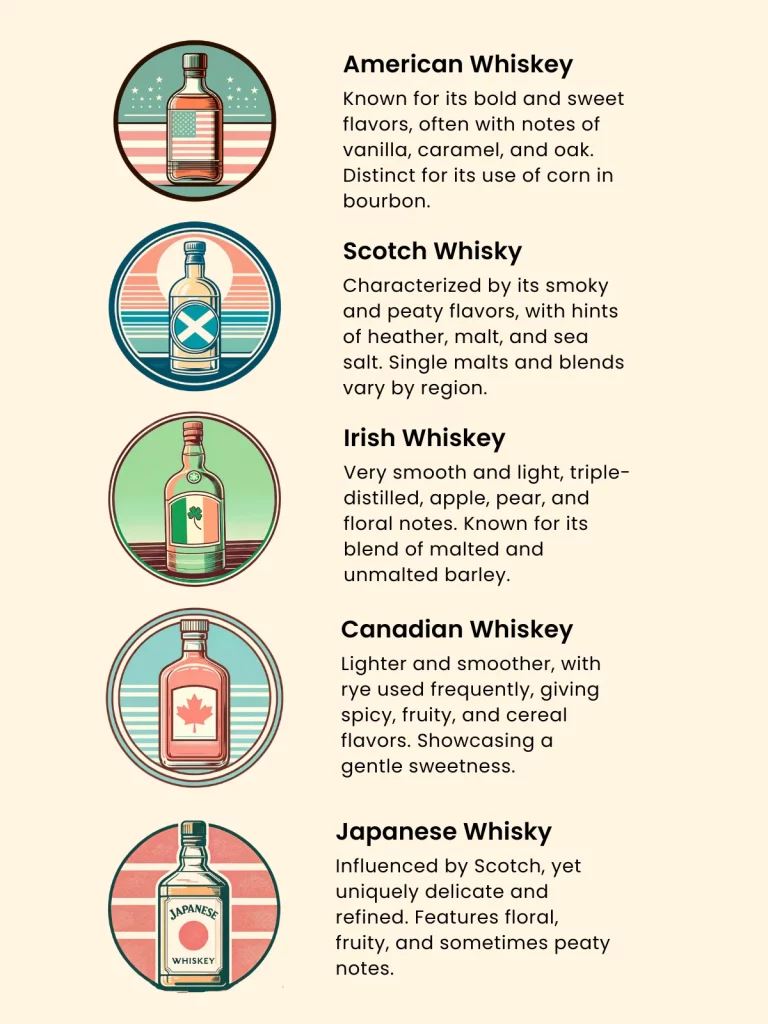
Irish Whiskey vs Canadian Whisky
Irish Whiskey and Canadian Whisky stand apart in their approach to whiskey making. Irish Whiskey’s hallmark is its triple distillation and predominant use of malted barley, which imbues it with a smooth, rich flavor. In contrast, Canadian Whisky often features a blend of grains, leading to a lighter, more versatile flavor profile that shines in mixed drinks.
Irish Whiskey vs American Whiskey
When comparing Irish Whiskey to American Whiskey, especially Bourbon, the distinction in sweetness and smoothness becomes apparent. American Whiskey’s higher corn content and aging in new oak barrels contribute to a pronounced sweetness. Conversely, Irish Whiskey is celebrated for its unparalleled smoothness and nuanced flavors, achieved through triple distillation and the use of unpeated malt.
Irish Whiskey vs Japanese Whisky
Irish Whiskey and Japanese Whisky both reflect a deep commitment to quality, yet they diverge in flavor and style. Japanese Whisky, with its Scottish-inspired techniques, tends towards a clean and refined taste. Irish Whiskey, however, is noted for its lighter, fruitier character, a result of its triple distillation process and unpeated malt, distinguishing it from the meticulously crafted Japanese variants.
Irish Whiskey vs Scotch Whiskey
The key difference between Irish Whiskey and Scotch Whisky lies in their use of peat and distillation practices. Scotch Whisky is famous for its distinct peaty and smoky flavors, a direct result of its production technique. Irish Whiskey, avoiding peat, offers a smoother and more accessible flavor, making it a gentler entry point into the diverse world of whiskey, highlighting the unique charm of each spirit.

